| Pokhara Area - Center of Tourism |
 |
Nepal Tourism - Pokhara |
|
|
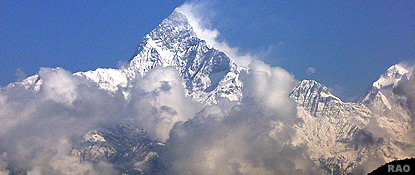 |
Pokhara,
known to be a paradise for tourists to relax and while away the time in
this scenic city, specially after trekking on the famous circuits of Ghandruk,
Ghodepani, Annapurna and Machhapuchhre. Pokhara has the capacity to accommodate
8,000 tourists in its guest houses and hotels and most of them would be
booked to the hilt in years gone. Around 6,000 tourism entrepreneurs are
running their business in the Sub-metropolitan city on rented houses. Around
5,000 hotels in the city are operated in rented buildings. Statistical
records at the Tourism Office, Pokhara, show that the city would draw as
much as 1 million tourists annually.
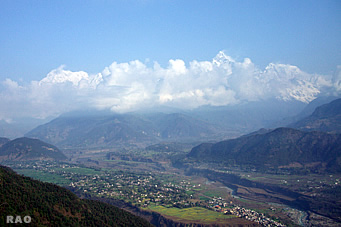 |
|
View
from Sarangkot near Pokhara
|
|
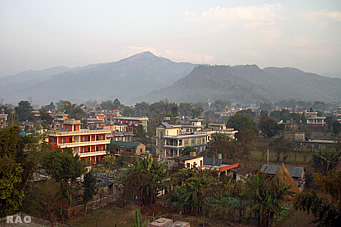 |
|
Pokhara
|
|
Filled
with lush vegetation and dotted with shimmering lakes, the Pokhara valley
had as a backdrop one of the most dramatic vistas in the world: a 140-kilometer
panorama of towering Himalayan peaks that in the clear air seemed close
enough to reach out and touch.
 |
Annapurna Massif
The Pokhara
Valley is lying 200 kilometers west of Kathmandu, at the foot of the Annapurna
Massif. |
The city of Pokhara is connected to the rest of Nepal by two
highways and numerous daily air flights.
The
valley remains as beautiful as ever, and only slightly less peaceful. The
valley's low altitude (900 meters) and sub-tropical climate allow bananas
and citrus trees, cacti and rice to flourish, while a half-dozen lakes
dot the landscape. Behind this lush scenery rise the snow-covered mountains.
Dhaulagiri, Himalchuli, Machhapuchhre and the five peaks of the Annapurna
Massif fill the horizon, rising, it seems, directly from the valley floor.
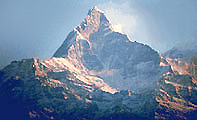 |
Machhapuchhre
Pokhara
can be reached in thirty minutes via flights from Kathmandu, 6 hours by
bus or, more comfortably, in a rented car with driver. Those with enough
time can take the traditional route to Pokhara, travelling on foot through
Nepal's hill country. The week-long trek from Kathmandu is easy, ideal
for families with children, and passes through the ancient capital of Gorkha.
Simple food and lodging are available in small villages along the way. |
|
Pokhara
is one of the few places in the world with such a dramatic view in a subtropical
setting. Machhapuchhre, for example, is only 45 kilometers from
the hotels on Phewa Lake's shoreline, without a single mountain range between.
This spectacular setting has made Pokhara justifiably popular with Nepal's
visitors. For some, Pokhara is the starting or ending point for a trek
into the Annapurna region. Others enjoy the peaceful valley for its relaxed
pace-a good antidote to urban Kathmandu-and its many recreational opportunities.
The
heart of Pokhara , the "new town" around the bus station, is full of modern
shops selling everything from instant photos to videos. The town's old
bazaar, stocked with traditional goods like copper pots and cotton cloth,
stretches along two main streets in the northern section. A half-hour walk
south of the bus station is Lakeside, a neighborhood of lodges, restaurants
and shops-the area favored by travellers.
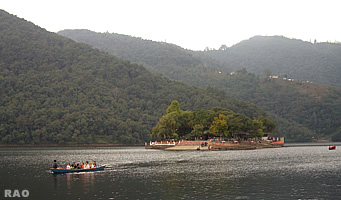 |
Phewa Tal
Pokhara's
main attraction is Phewa Tal (tal means "lake" in Nepali) and the
peace and quiet of fewer cars. Lining the lakeshore are a number of good
lodges and restaurants. Budget travellers looking for a quiet place should
try the side lanes leading off the main road.
Several
larger hotels near the airport offer up-scale accommodations with expansive
gardens and mountain views. The Fishtail Lodge at the east end of the lake
is worth a visit . |
|
Once
settled in Pokhara, you may be content to relax for a few days and admire
the beauty. It is worth getting up very early in the morning to enjoy the
beautiful view of sunrise on the Himalaya.
Dawn
is also the time to pick out the summit of Annapurna I, a 8000-meter peak
in the north of the city. The large grassy meadow in the middle of Lakeside
offers a clear view of the mountains, and is also a good place to watch
the fishermen, some still paddling old-style wooden dugout canoes, heading
out for their morning's work.
 |
| Machhapuchhre,
the "Fishtail Peak", dominates the horizon northwest of Pokhara like
an ice-capped pyramid. After a few days' walk to the northwest, the twin
peaks which form the fishtail become visible. |
|
The
6977 meter mountain remains officially unclimbed. It is not allowed to
climb to the Machhapuchhre's main peak, out of respect for the deities
who are believed to reside there.
Phewa
Tal, one of the largest lakes in Nepal, is the centerpiece of the valley.
Swimming or fishing are best done from a boat. Rent a rowboat for a few
hours or a whole day and visit the opposite shore, stop at the small island
temple of Varahi in the middle of the lake, or find a secluded corner of
your own.
The
old bazaar is lying a two-hour walk from Lakeside. The dozens of small
shops lining the streets sell everything from silver jewellery to soap.
Day
walks and overnight trips in the valley and surrounding hills give a glimpse
of rural Nepal to the visitor. One of the most popular journeys is the
three-hour walk up to Sarangkot, the prominent 1700-meter hill just past
the lake's distant end. In Sarangkot the Himalayan range is stretched out
directly in front of you. It's possible to stay in Sarangkot overnight,
or to continue several hours further along the ridge to the village of
Naudanda, another popular viewpoint, before heading back to Pokhara via
Surkhet.
 |
|
Begnas
Lake
|
 |
Rupa
and Begnas Lakes, 15 kilometers east of town, less-visited alternatives
to Phewa Tal. |
 |
Kahun
Danda, the ridge to the east of Pokhara, identified by the view tower
atop it. |
 |
Mahendra
Gufa, a series of large limestone caves near the village of Batulechaur. |
 |
The Tibetan
refugee camp at Hyangja, an interesting destination, and a good place
to shop for Tibetan crafts. |
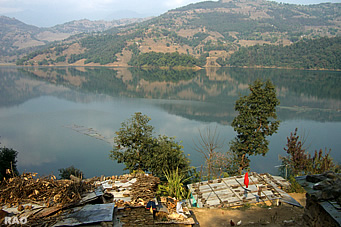 |
|
Begnas
Lake
|
|
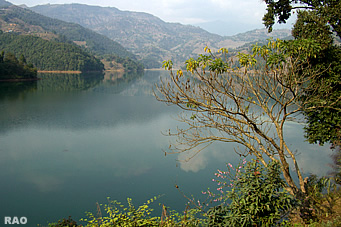 |
|
Begnas
Lake
|
|
| More
information and pictures |
 |
 |
|
Peace
Stupa
|
|













